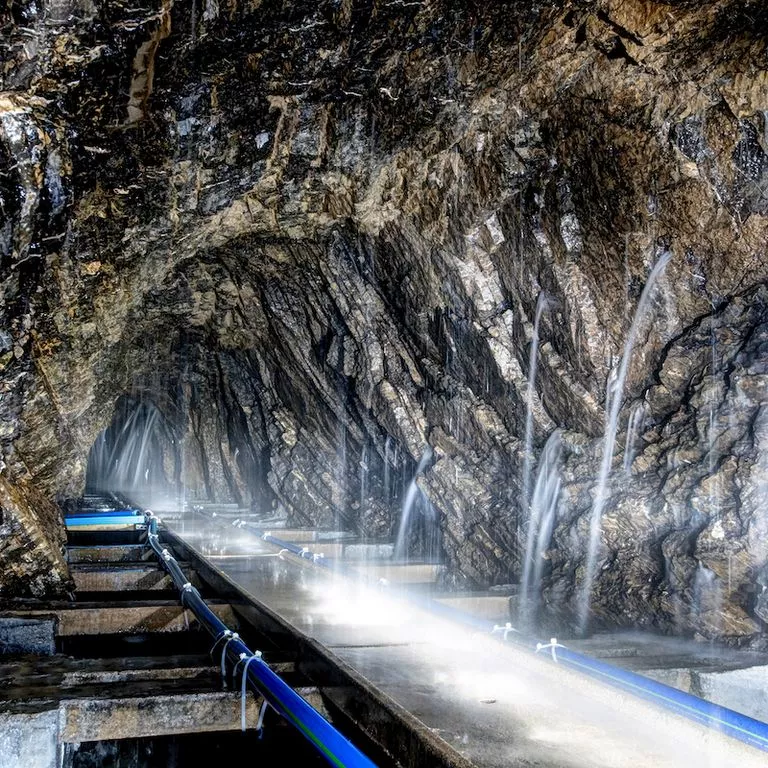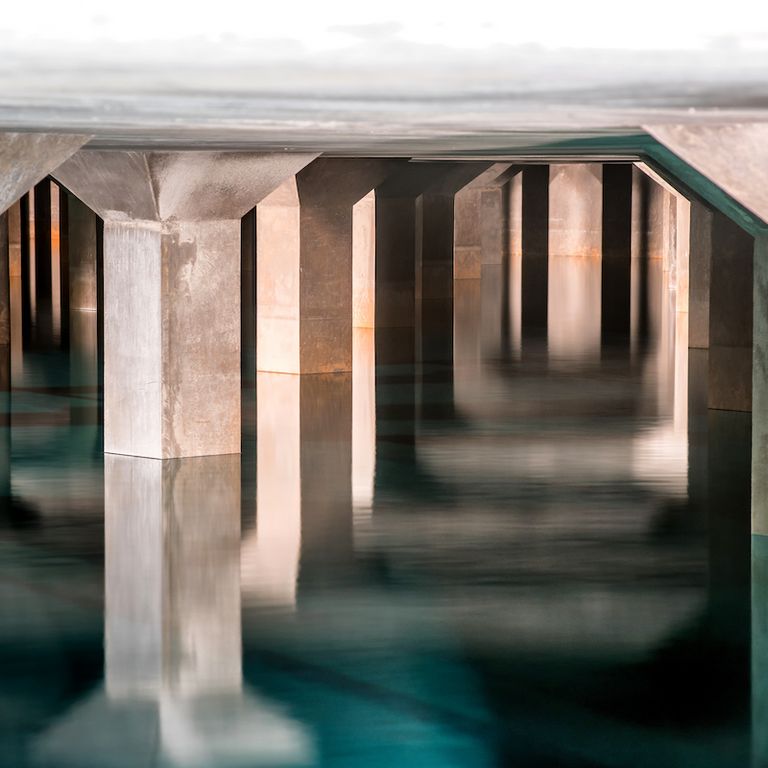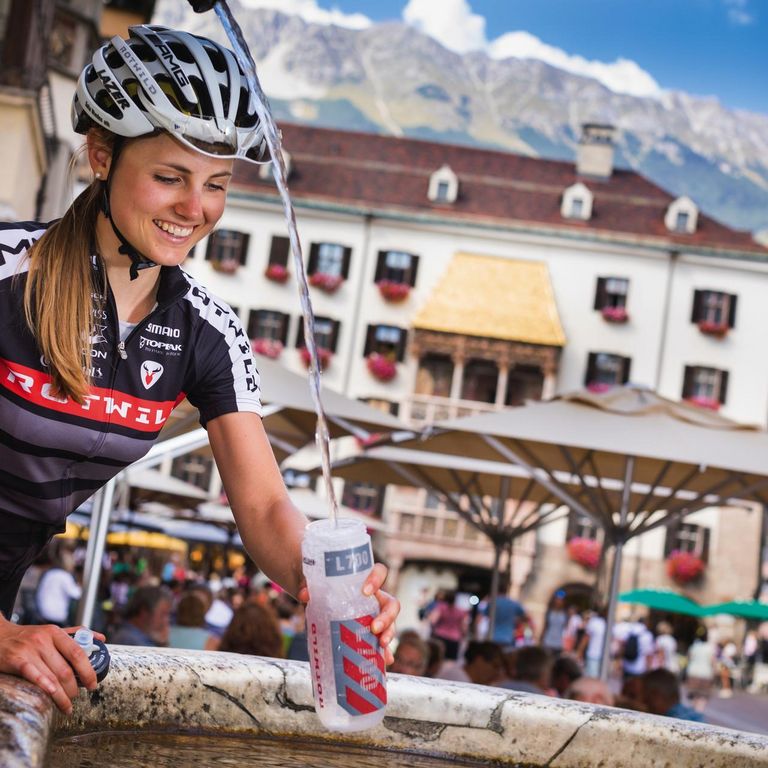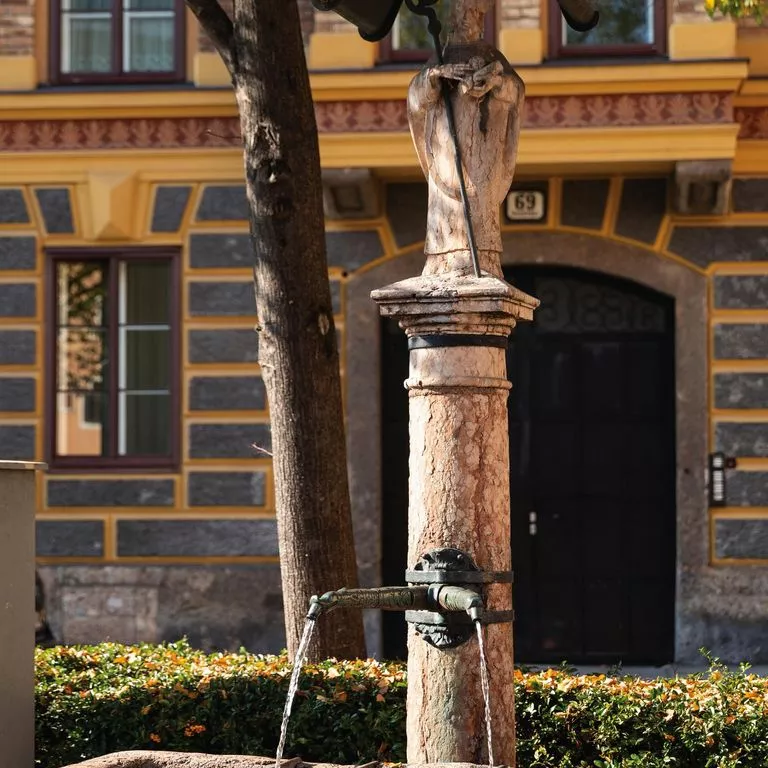Water enriched in the rocks
Gerd Albrecht has brought an empty glass with him. He holds it under the powerful jet of water flowing from the ancient fountain and fills it right up to the rim. After waiting until the liquid has completely settled, he holds the glass up into the sunlight and watches as the sparkling rays of light are refracted as if passing through crystal. The water expert tells us that it takes a good ten years for the water to reach the glass. This precious liquid is enriched in the rocks where it becomes something truly special that should be treasured and protected. Strict protection regulations and specialists like Gerd Albrecht are therefore used to safeguard the extraordinary quality of Innsbruck’s water.
The engineer explains to us that most of Innsbruck's drinking water is supplied by the “Mühlauer Quelle” spring water facility, which uses a kilometre-long system of tunnels high above the city to collect water. This system is able to achieve a flow rate of 600–2000 litres per second. Two pressure pipelines then bring the water from the so-called "Wasserschloss" (water castle) up on the mountain down into the valley, covering a distance of 445 metres before reaching Mühlau. In Mühlau, the water flows into a distribution network that is 460 metres long and used to fill empty glasses all over the city. After finishing his story, the water expert gives us a refreshing smile.


The treasure chambers
We follow Mr Albrecht a short way up the mountain from the fountain in Mühlau until we reach a well-secured building. Cameras peer down from solid walls, while barbed wire and heavy locks secure the treasure inside. The treasurer’s keys jangle as he turns one in the lock and slides the bar open. He asks us to refrain from taking photos for security reasons. We’re also not allowed to touch anything due to the importance of hygiene. Before we enter the treasure chambers, Gerd Albrecht shows us the facility’s two giant drinking water turbines. As the water makes its way down into the two underground high-level tanks, the water pressure is actually also used to generate sustainable electricity. Mr Albrecht points to a chamber several metres under the ground, where huge steel pipes transport the masses of water through the system. We climb down some narrow stairs into the depths of the system, hearing the tons of water rushing through the walls next to us. The keys jangle again and when the door opens, we can’t help but gasp.
We are greeted by the sight of two expansive lakes full of what looks like black crystal but is actually an unbelievable twenty-six million litres of drinking water. The two high-level tanks are eight metres deep, as dark as night and as smooth as glass. The air is cold enough to make you shiver, which makes sense given that the water has a chilly temperature of five degrees Celsius when it comes down from the rocks, explains Mr Albrecht with a smile. This is the ideal temperature for ensuring that the water remains completely free of germs and can therefore be supplied to the people of Innsbruck in what is guaranteed to be its completely natural form, fresh from the mountains and with no treatment whatsoever.
The city of Innsbruck gets its water from a total of twelve springs with just as many high-level tanks. The facility in Mühlau is the biggest by far and is responsible for providing 90 percent of the city’s water supply. All of the high-level tanks are also used as buffer tanks in order to ensure that the springs of Innsbruck are able to provide local residents with crystal-clear spring water directly from the mountains 24 hours a day.


The Innsbruck Water Trail
When the friendly water expert brings us back up to the surface, he gives us a couple of tips before saying goodbye. Anyone who wants to find out more about Innsbruck’s water should take a look at the Innsbruck Water Trail, a beautiful hike leading through the picturesque Mühlau Gorge and up into the area of the springs. The trail continues from there along a panoramic path to the Arzler Alm mountain hut where hikers can stop off and refuel before heading back down to the city. Incidentally, the Water Trail begins right here at the Mühlau fountain.
If you’d rather explore the water’s journey to Innsbruck from the comfort of your own home, you can also experience it in digital form HERE This 360° virtual reality experience in the form of a fascinating 3D film project by the City of Innsbruck is sure to impress you and was recently even presented with the “Neptun Wasserpreis 2019”, an Austrian award for achievements focusing on water. But be warned: it might make you thirsty!



